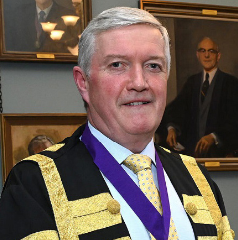The lack of consultant status for occupational medicine is hampering the specialty, according to trainees. Catherine Reilly reports
RCPI specialist trainees in occupational medicine have highlighted to the Minister for Health the “unmerited and inexplicable” lack of consultant status for their specialty in the HSE/HSE-funded services.
The “demoralising” situation is leading to a loss of “talent and excellence”, which has wider negative implications for the health service, according to the trainees undertaking the higher specialist training (HST) programme through the RCPI Faculty of Occupational Medicine.
“A conscious shift away from occupational health by most or all of our group would be an enormous loss to the field as well as a considerable waste of the resources committed to our training,” according to a letter signed by all 13 trainees which was recently sent to Minister Stephen Donnelly. The correspondence was copied to HSE CEO Mr Bernard Gloster, RCPI President Dr Diarmuid O’Shea, and Dean of the Faculty Dr Sheelagh O’Brien, among others.
When contacted by the Medical Independent (MI), RCPI President Dr O’Shea and Faculty Dean Dr O’Brien issued a joint statement calling for immediate action to ensure consultant status for the specialty. “Immediate action is required to ensure fully accredited and trained occupational medicine specialists can take their place in the Irish health service as consultants alongside their colleagues in other specialties.”
“The Faculty, which is accredited by the Medical Council of Ireland, meets the strict standards required to deliver postgraduate specialist training in occupational medicine and our graduates are rigorously trained to meet the challenges of consultant posts within the health service.”
The Faculty “continues to advocate for consultant status for occupational medicine professionals who have completed higher specialist training, as in other medical specialties. Occupational medicine physicians remain the only specialty trained physicians not accorded consultant status.”
Dr O’Shea and Dr O’Brien added that occupational medicine is “vital” to the public health service in Ireland and to the health and wellbeing of the people it employs. “Occupational medicine specialists undertake the same level of training and assessment as other specialties. However, the lack of consultant status is a barrier to recruitment and retention causing delays in occupational health service provision within the health service.
“To meet the workforce planning needs of our health service, there is a crucial need to increase training numbers and retain these highly qualified specialists. According them consultant status, in line with international standards, is the first step to recruiting and retaining these specialists to meet the growing demand.”

As previously reported by MI, many trainees in occupational medicine only become aware of the lack of consultant status during their training.
As of early April 2024, the section on HST at the Faculty of Occupational Medicine on the RCPI website stated that on completion, trainees receive a certificate of satisfactory completion of specialist training (CSCST) which allows them to enter the Medical Council’s specialist register. “This means you can apply for consultant posts,” added the webpage, using the same generic wording applied across the various faculties’ pages.
A conscious shift away from occupational health by most or all of our group would be an enormous loss to the field as well as a considerable waste of the resources committed to our training
This misleading line on consultant posts was removed from the text when MI brought it to RCPI’s attention.
Attrition
According to the trainees’ letter, doctors have declined SpR places on the programme due to the lack of equivalent status. Three SpRs have left in recent years, which accounted for 23 per cent of the trainees. This is significant given the size of the scheme (an intake of two SpRs per year).
The letter stated regretfully that “many of us would not have trained in this specialty if we had known we would not have public [health] service consultant status” at the end of HST.
Many trainees are considering moving permanently to health systems such as the NHS – where the specialty has had consultant status since the 1980s. At present, HSE occupational health physician (OHP) posts are also subject to the recruitment embargo.
Speaking to MI, SpR Dr Grainne O’Sullivan said the situation reflected “a complete lack of recognition of the work and training that we have put in, the years of service, the years of training, the years of sacrifice”.
Her colleague Dr Mary-Teresa O’Neill noted the HSE substantially invested in their training, but cannot offer a specialist post on a par with peers. It is “very disheartening”, she said.
The impact of non-consultant status on the quality of their careers, their standing within multidisciplinary teams, and earnings, are of major concern.
Entrants to the four-year HST programme must have completed basic specialist training or be qualified GPs. Dr O’Neill said there are many components to the qualification including exams, mandatory study days, worksite visits, research obligations, etc. They receive a CSCST upon completion and can enter the specialist register of the Medical Council.
“But we are still not considered consultants, so all of our terms and conditions are completely different…. It doesn’t seem to make any sense to us,” she said.
Dr O’Sullivan recalled comments by public health doctors prior to gaining consultant status that they felt they were not considered equal to other specialists in multidisciplinary teams.
“And that is similar for us,” she said.
“But we do have the same level of responsibility [as other specialists],” added colleague Dr Abigail O’Reilly. She said they had taken hope from the breakthrough made by public health medicine in 2021, through the IMO, after a decades-long battle. However, there was no imminent sign of movement for them, and the trainees decided they needed to directly highlight the matter.
The HSE recruitment embargo is an immediate concern. “There are four of us actually finishing the scheme this year and none of us will be able to take up public jobs [in the public health service] as a result of not having consultant status,” stated Dr O’Sullivan.
Over recent years, the HSE has been contracting a significant proportion of occupational health provision to private companies despite investing heavily in the training of these specialist physicians.
Implications
The trainees underlined the wider negative implications for staffing, patient safety, and quality-of-care in the health service. Under HSE policy, employees need to be reviewed by an OHP in various circumstances including long-term sickness absence or following injury or assault in the workplace.
Current waiting times for appointments with an OHP are significant, with many employees waiting six weeks or more to be seen. According to the trainees, there are several factors contributing to the time to appointment (which can be a number of months in some departments) – not least a shortage of OHPs with posts unfilled.
Dr O’Reilly said it is common for managers to write in again to occupational health departments stressing the need for an appointment for a staff member. Delays in the provision of assessments impact on staffing levels which “begets more problems for the general health service”.
In their letter, the trainees expressed concern that errors, mistakes, and incidents are more likely to occur in these understaffed departments.
Demographics and ageing are also driving an ever-increasing demand for occupational health provision. Dr O’Neill noted: “The workforce is as big as it has ever been…. There is a big demand and is
only increasing. It is considered the standard of care now for an employer to provide ready access to an occupational medicine physician.”
Another of the SpRs, Dr Patrick Carr, emphasised the need for equity with peers in the RCPI and the wider colleges within the Forum of Irish Postgraduate Medical Training Bodies.
Department of Health
The IMO recently secured an improvement in the pay scale for OHPs after a long process, but it is still far below the consultant salary. The Organisation has been seeking consultant status. In 2021, the Department of Health stated the matter was under consideration.
At the IMO AGM on 5 April, MI queried Minister Donnelly about the anomaly in status for these specialists. Minister Donnelly responded: “It’s not something that has been discussed at any length with me, but certainly it’s something I’d be more than happy to take a look at and discuss with both the HSE and the Department.”
Further comment was awaited from the Department at press time.
The HSE is nearing the completion of a review of the model of occupational health services drawing on “international best practice”.












Leave a Reply
You must be logged in to post a comment.